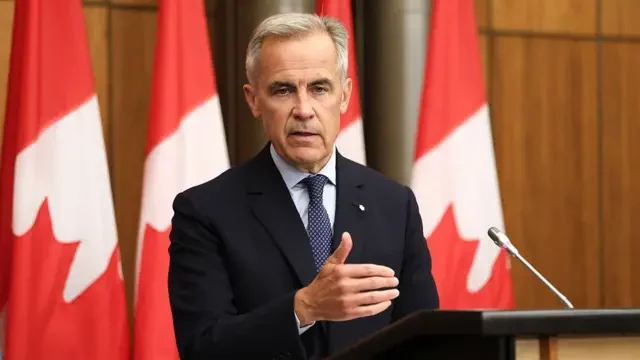Canada will roll back a large portion of its retaliatory tariffs on American goods, Prime Minister Mark Carney announced on Friday, while maintaining stiff levies on steel, aluminium, and automobiles.
The move followed a phone call between Carney and US President Donald Trump on Thursday, their first direct discussion since the two neighbours missed a self-imposed deadline to strike a trade agreement.
Canada had slapped a 25% levy on about C$30 billion (£16bn; $21.7bn) worth of US imports, targeting items such as orange juice and washing machines, in response to Washington’s sweeping tariffs on Canadian products. The US tariffs, valued at 35% on non-compliant goods under the countries’ free trade deal, were part of Trump’s wider global trade offensive.
Carney said Ottawa will now align with Washington by lifting tariffs on goods that meet the requirements of the US-Mexico-Canada Agreement (USMCA).
“This will re-establish free trade for the vast majority of goods that move between the two countries,” the prime minister said, noting the decision takes effect September 1.
The White House welcomed the announcement, calling it “long overdue.” In a statement to CBS, the US administration added it looks forward to “continuing discussions with its northern neighbour about trade and national security.”
Carney, elected in April on a tough “elbows up” trade policy with the US, rejected suggestions that Ottawa was softening its approach.
“Canada has a better tariff deal with the US than many other countries because of the free trade carve-out,” he told reporters.
“That puts the actual tariff rate on Canadian goods at about 5.6%, much lower than the average of around 16% for other countries. As we work to address outstanding trade issues with the US, it’s important we do everything we can to preserve this unique advantage for Canadian workers and businesses.”
Despite Friday’s easing, Ottawa will hold firm on its 25% tariffs on American steel, aluminium, and autos. The US, for its part, has imposed a 50% tariff on all steel and aluminium imports except those from the UK alongside additional duties on copper and aluminium.
Carney said Canada’s next focus will be on accelerating negotiations over autos, steel, aluminium, lumber, and other critical sectors before the scheduled USMCA review next year.
Canada remains one of just two countries, alongside China, to retaliate directly against US tariffs. Polling suggests most Canadians back Ottawa’s hardline approach.
Since returning to the White House in January, Trump has relaunched a global trade war, ratcheting up tariffs on imports worldwide and vowing to push even higher as he seeks deals he considers favourable to the US.





